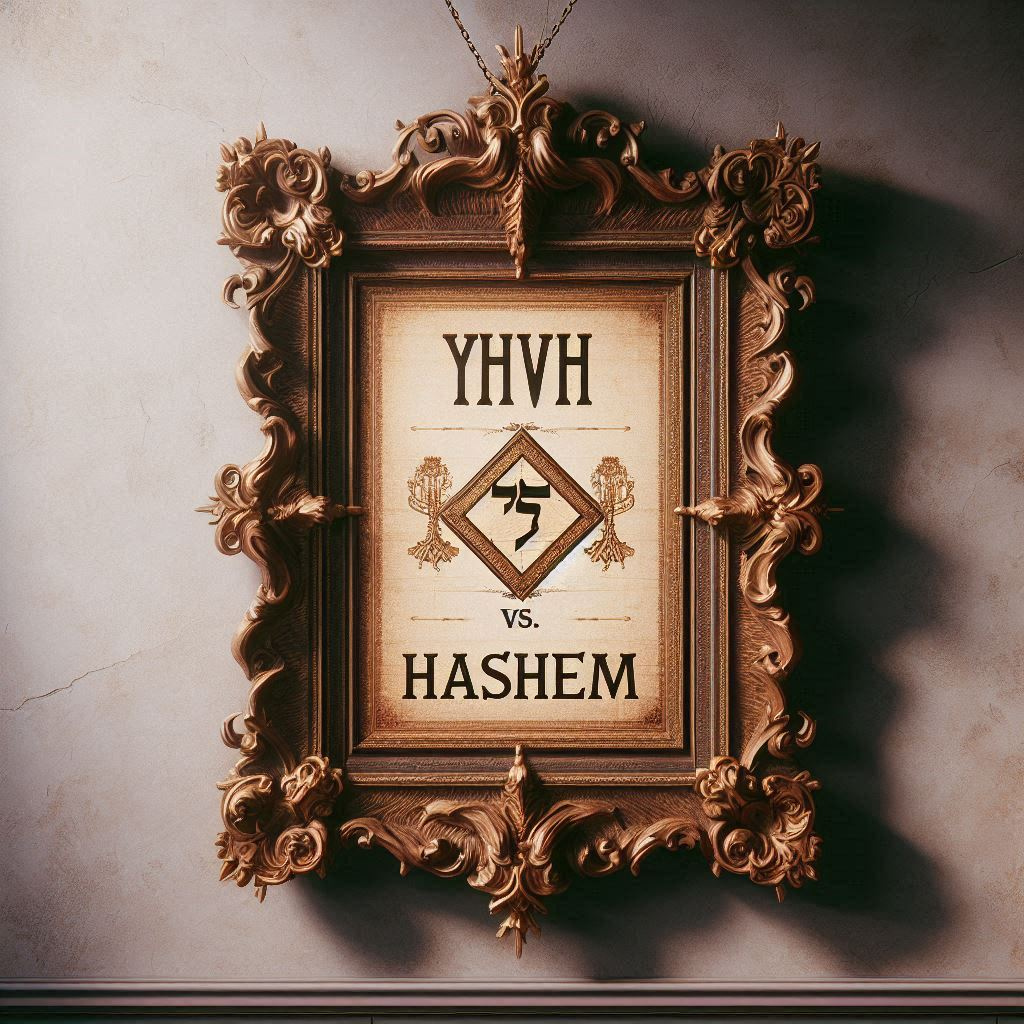The Ineffable Name Controversy: Breaking Traditions and Unveiling Truth
Introduction: In the realm of faith, the Name of Yehovah holds profound significance. However, the tradition of not uttering or writing this sacred name has sparked controversy and debate. This blog post delves into the origins, interpretations, and implications of this practice, shedding light on the true essence of the Ineffable Name.
The Tradition of Writing “G-d”: Many Jewish communities avoid writing the full name of God, opting for “G-d” instead. This practice stems from a passage in Deuteronomy, which commands the Israelites to destroy the names of non-Israelite gods. Rabbinic interpretations extended this to mean that God’s name should not be erased, leading to the tradition of writing “G-d”1.
Rabbinic Interpretations and Misinterpretations: Rabbinic authorities, such as Rashi, interpreted the prohibition against erasing God’s name as a reason to avoid writing it altogether. This led to the practice of storing or burying Jewish literature containing the name “God” once it fell into disrepair2. However, this interpretation has been contested, as the original scriptural intent was to prevent the worship of Yehovah in the manner of pagan gods3.
The True Name of Yehovah: The Father revealed His eternal and holy name to Moses, declaring it to be remembered for all generations (Exodus 3:15). Despite this, Rabbinic authorities replaced the name Yehovah with titles and descriptors like “Adonai” and “Elohim,” effectively nullifying the Torah’s instructions regarding the use of God’s name4.
The Impact of Rabbinic Regulations: By enacting regulations against using God’s name, Rabbinic authorities transgressed Yah’s eternal Torah. This has led to a widespread practice of substituting God’s name with titles, which often have pagan origins5. This practice contradicts the scriptural mandate to declare and magnify Yehovah’s name throughout the earth6.
Conclusion: As Torah-observant disciples, it is our duty to honor and proclaim the true name of Yehovah. By doing so, we fulfill the scriptural command to declare His name to all generations. Let us break free from traditions that obscure the true essence of God’s name and embrace the profound significance of Yehovah.
For those of you who would like to explore this week’s Torah Reading 13, I invite you to read and listen to the discussion entitled “Yehovah: the God Who Sees.” (Yehovah-The God Who Sees-STAR 13)
Even the Small Things Matter to God-A Messianic Study of Exodus 4:22-26-STAR-48
Introduction This is “Even the Small Things Matter to God.” This is the 48th Reading of our 3-year Torah Reading Cycle. It is contained in Exodus/Shemot 4:14-6:1. But we will be focusing just on verses 22 to 26. Looking Back to STAR-47, entitled “God’s Holy...
Rosh Chodesh 6th Month 2022-The Start of the 6th Biblical Month
Chag Sameach Rosh Chodesh beloved. Happy and blessed 6th Month to you all. As I am posting this brief discussion here on The Messianic Torah Observer, the renewed moon will have been sighted by at least two-trained observers in Yisra’el. Thus, wherever we live ...
God’s Holy Character–A Messianic Study of Exodus 3:1-4:13
Introduction This is God’s Holy Character-A Messianic Study of Exodus 3:1-4:13. It is the 47th Torah Portion of our 3-year Torah-reading cycle. Now, despite there being a great many historical and spiritual nuggets that the practical, truth-seeking...
Israel-The Birth of a Nation Through Tribulation-STAR-46
This is Israel: The Birth of a Nation Through Tribulation. It is a study of the 46th Parshah of our 3-year Torah Reading Cycle. This week's reading is found in Exodus/Shemot 1:1-2:25. Introduction to the Reading The historical record transitions from that of a focus...
Death-the Grave-the Resurrection-Part 2
Introduction This is part 2 of our discussion on death, the grave, and the resurrection. And we will be picking up where we left off in part 1, which if you haven’t had the opportunity to either read or listen to that post on any of the platforms in which...
He Was Gathered unto His People-Death-The Grave-The Resurrection–Part-1–STAR-45
Introduction This is “He Was Gathered unto His People—Death-The Grave-The Resurrection—Part 1” This will be a discussion on the 45th Torah Reading of our 3-year Torah Reading Cycle. Our focus text is Genesis/Beresheit 49:27-50:26. This passage concludes...
The 9th of Av–You Are Called by Name–STAR-44
Tisha B'Av--The 9th of Av--"The Saddest Day of the Jewish Calendar Year." According to Hillel’s Calendar, which I frequently refer to as the Jewish Calculated Calendar, as I am recording and posting this installment of TMTO Sabbath Thoughts and...
“Let No Man Judge You” in Your Keeping of Torah–A Messianic Examination of Colossians 2:16-17
This is "Let No Man Judge You" in Your Keeping of Torah--A Messianic Examination of Colossians 2:16-17. This is sort of a continuation, if you will, to our very last installment which was entitled “Did the Apostle Paul Permit the Eating of all Meats? A...
Did the Apostle Paul Permit the Eating of All Meats? A Messianic Examination of 1 Timothy 4:1-5
Setting the Table for our Discussion Here Today This is “Did the Apostle Paul Sanction/Permit the Eating of all Meats? A Messianic Examination of 1 Timothy 4:1-5.” Our discussion here today will serve as another installment to our massive Paul and Hebrew...
Does Torah Cause Someone to Sin More? A Messianic Examination of Romans 5:20
Goal: This is “Does Torah Cause Someone to Sin More? A Messianic Examination of Romans 5:20.” And so, our survey of the hard-to-understand—those challenging Pauline passages—takes us in today’s installment of TMTO, to Romans 5:20. And the KJV...

